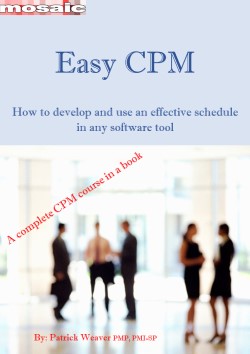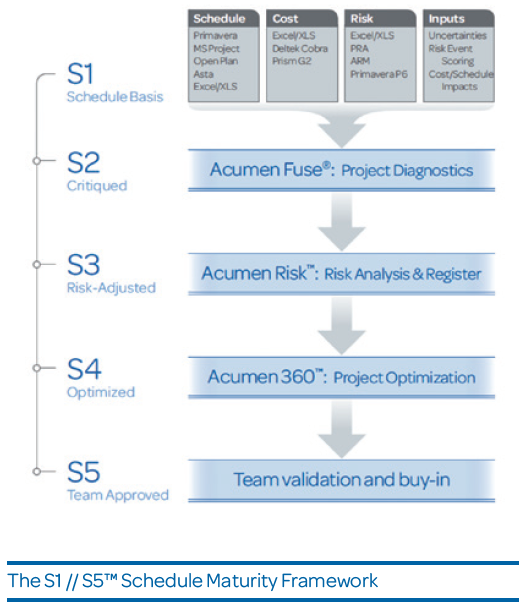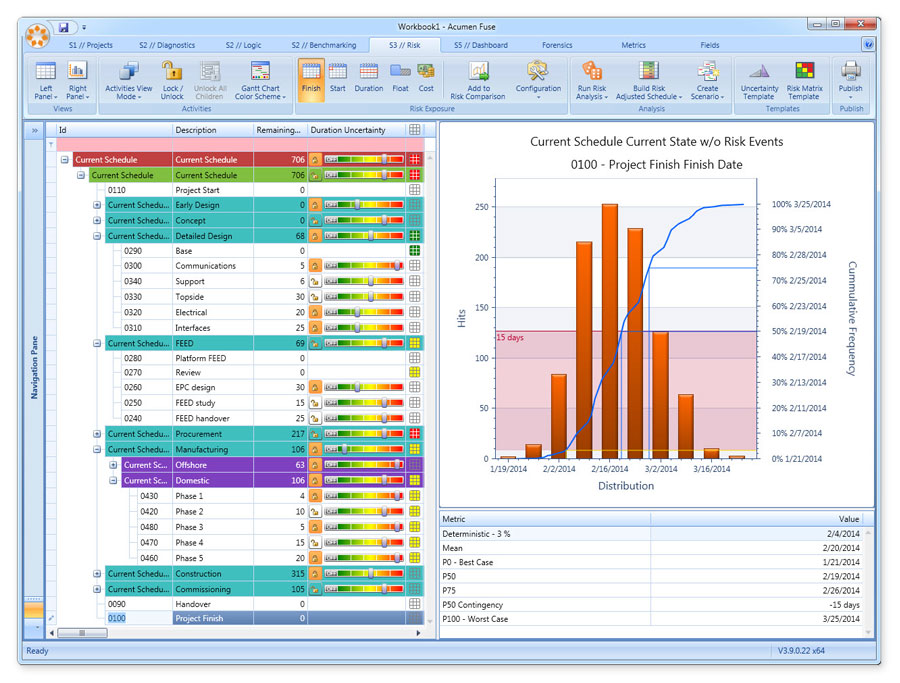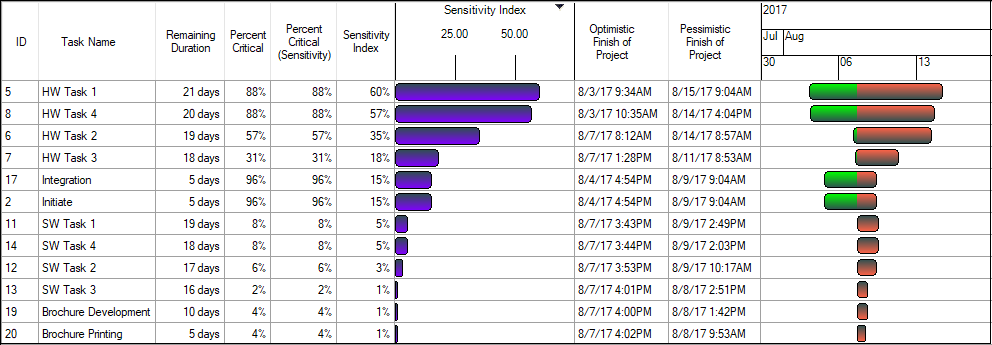Location:
PMKI > Project
Controls and Scheduling > Schedule Risk
Assessment.


- Schedule Risk Overview
- Risk Assessment and Analysis
- Schedule Risk Tools
- Useful External Web-links &
Resources.
Other related sections of the PMKI:
- Project Risk Management
- Project Risk Assessment
- Risk management &
Decision Support Software.
 Every
estimate included in a schedule has a degree of risk (ie,
an uncertainty that matters) associated with the estimate.
It is impossible to predict the future with complete
certainty - recognizing and managing this risk leads to
far better project outcomes than attempting to avoid the
risk through contracts or simply ignoring the issue. For
more on managing risk, visit our advanced
risk management page.
Every
estimate included in a schedule has a degree of risk (ie,
an uncertainty that matters) associated with the estimate.
It is impossible to predict the future with complete
certainty - recognizing and managing this risk leads to
far better project outcomes than attempting to avoid the
risk through contracts or simply ignoring the issue. For
more on managing risk, visit our advanced
risk management page.
Art: Predicting project completion. The use of Earned Schedule and the 'P-Factor in determining a realistic completion date are defined.
Blg: Predicting Completion. The requirement to finish a 'project' on time with associated penalties for late completion has been around for 3000 years. The question asked in this post is when did predictive tools start to emerge to give the contractor some insight into the consequences of current performance rates?
Prs: Baked In Optimism – Why so many projects fail. This presentation looks at two processes that are ‘baked into’ standard project management estimating and control to show how recommended good practices are still optimistically biased. When preparing an estimate good practice recommends using Monte Carlo to determine an appropriate contingency and the level of risk to accept, but the typical range distributions used are biased – they ignore the ‘long tail’. When reporting progress, the estimating bias should be identified and rectified to offer a realistic projection of a project outcome. Standard cost and schedule processes typically fail to adequately deal with this challenge meaning the final time and cost overruns are not predicted until late in the project. This presentation highlights some of the causes for these problems - View the webinar on our Risk Assessment Page.
Schedule risk management is contained in Sections 6 of Easy CPM.
 Easy CPM is
an easy-to-read, course-in-a-book that provides practical
training and guidance to individuals and organizations
involved in developing or using CPM schedules based on the
Critical Path Method (CPM). It is designed to act as both
a reference, and practice guide, for people implementing
CPM scheduling after they have learned to use the CPM
scheduling software of their choice.
Easy CPM is
an easy-to-read, course-in-a-book that provides practical
training and guidance to individuals and organizations
involved in developing or using CPM schedules based on the
Critical Path Method (CPM). It is designed to act as both
a reference, and practice guide, for people implementing
CPM scheduling after they have learned to use the CPM
scheduling software of their choice.
 A
well developed, realistic schedule reduces risk. The
stages in developing this are:
A
well developed, realistic schedule reduces risk. The
stages in developing this are:
PP: Why Critical Path Scheduling (CPM) is Wildly Optimistic. The factors that drive CPM towards an optimistic initial assessment including psychological biases, single point estimates, and limitations of the CPM modelling process, are defined and quantified.
WP: Understanding PERT. PERT is the oldest and arguable the least effective / least accurate way to model uncertainty. This paper traces the origins of PERT and the reasons for its limitations.
Blg: What’s the Probability?? A quick look at probability and its affect on schedule completion (see more on probability).
SCRAM: The Schedule Compliance Risk Assessment Methodology. SCRAM is an approach for identifying risks to compliance with the program schedule, it is the result of a collaborative effort between Adrian Pitman from the Australian Department of Defence, Angela Tuffley of RedBay Consulting in Australia, and Betsy Clark and Brad Clark of Software Metrics Inc. in the United States. SCRAM focuses on schedule feasibility and root causes for slippage. It makes no judgment about whether or not a project is technically feasible. SCRAM can be used:
For more information and free resources see: https://sites.google.com/site/scramsitenew/home
Schedule risk tools model uncertainty based on
statistical probability:
Art: Standard Deviation for Project Managers. The concepts behind Standard Deviation and how it is used (see more on standard deviation).
Art: Predicting Future Project Outcomes - The power of uncertainty. Monte Carlo, Latin Hypercube and Sampling.
Blg: CPM Anomalies Invalidate Monte Carlo. Logical anomalies in a CPM schedule can cause major errors in a Monte Carlo assessment. This post highlights the issue.
Two commercial tools that apply these concepts are:
 Deltek Acumen Risk -
Accurately predict completion and understand the impact of
high-risk activities in terms of dollars and days. Acumen
Risk is an integrated cost/schedule risk analysis tool
combining true cost and schedule risk analysis against a
native project plan together with identified risk events
from a project risk register. It was the first truly
integrated and easy-to-use cost/schedule risk analysis and
risk register software that helps you effectively account
for and proactively reduce project risk exposure. Acumen
Risk’s Uncertainty Factor is a simple-to-use sliding scale
that project teams can relate to, to develop a truly
integrated means of linking schedule risk to cost risk so
that you can determine the impact of schedule delays on
your project cost estimate.
Deltek Acumen Risk -
Accurately predict completion and understand the impact of
high-risk activities in terms of dollars and days. Acumen
Risk is an integrated cost/schedule risk analysis tool
combining true cost and schedule risk analysis against a
native project plan together with identified risk events
from a project risk register. It was the first truly
integrated and easy-to-use cost/schedule risk analysis and
risk register software that helps you effectively account
for and proactively reduce project risk exposure. Acumen
Risk’s Uncertainty Factor is a simple-to-use sliding scale
that project teams can relate to, to develop a truly
integrated means of linking schedule risk to cost risk so
that you can determine the impact of schedule delays on
your project cost estimate.
See more at:
https://www.deltek.com/en/products/project-and-portfolio-management/acumen/modules/acumen-risk
Barbecana’s Full Monte

Full Monte is schedule risk analysis software that integrates seamlessly with Microsoft Project 2007 through to 2016. Full Monte for Oracle Primavera P6 is a standalone application working directly against the P6 database, so requires no import or export. Full Monte utilizes the Monte Carlo simulation method, and is fast and easy-to-use. Some of the features include:
See more at: http://barbecana.com/
For more risk management tools visit our PM Software page.
SCRAM - Schedule Compliance Risk Assessment Methodology home page: https://sites.google.com/site/scramsitenew/home
RedBay Consulting Pty Ltd (developer of SCRAM): http://www.redbay.com.au/
Access the Guild of Project Controls Body of Knowledge. A suite of process-based documents which define Project Controls (membership required): http://www.planningplanet.com/guild/GPCCAR-modules